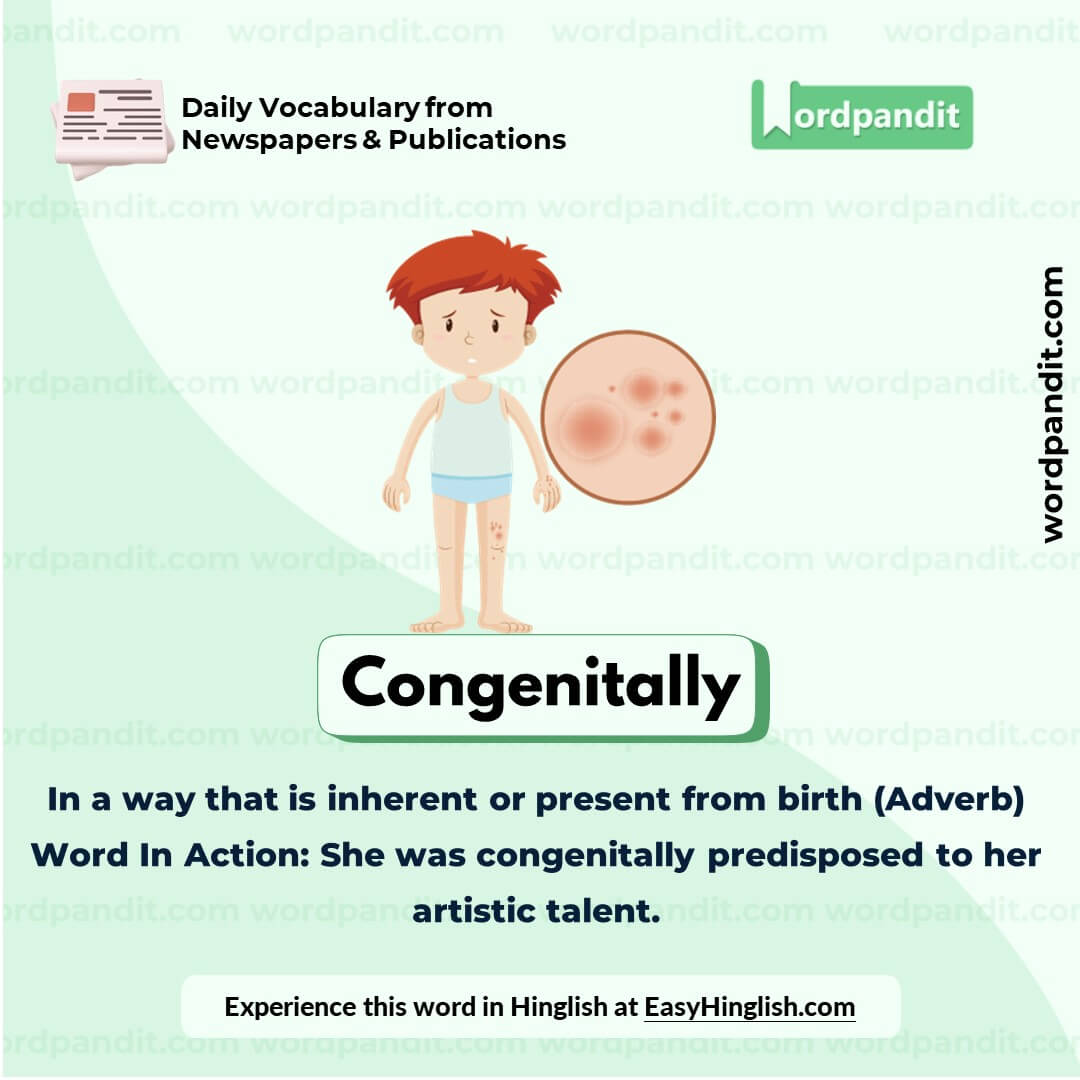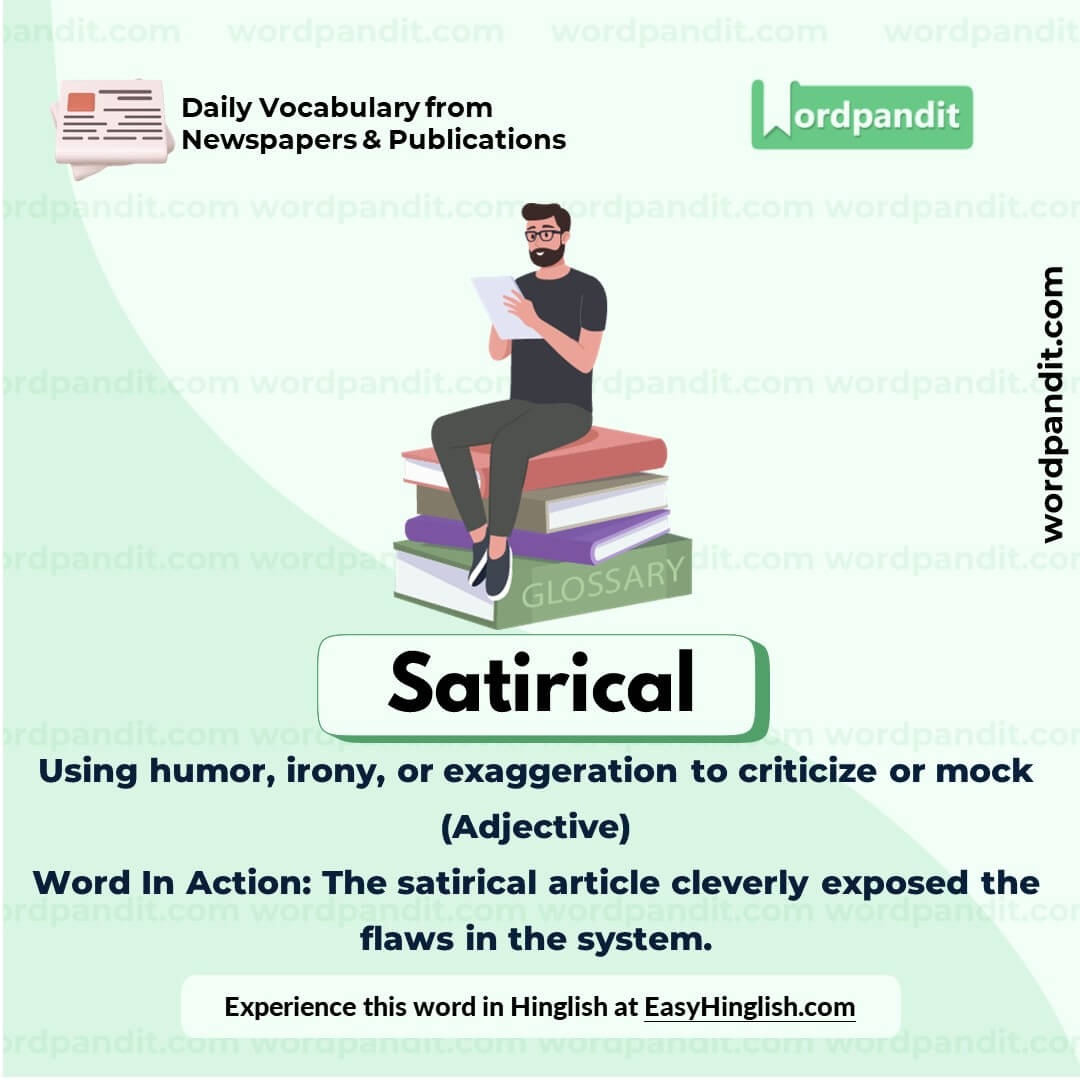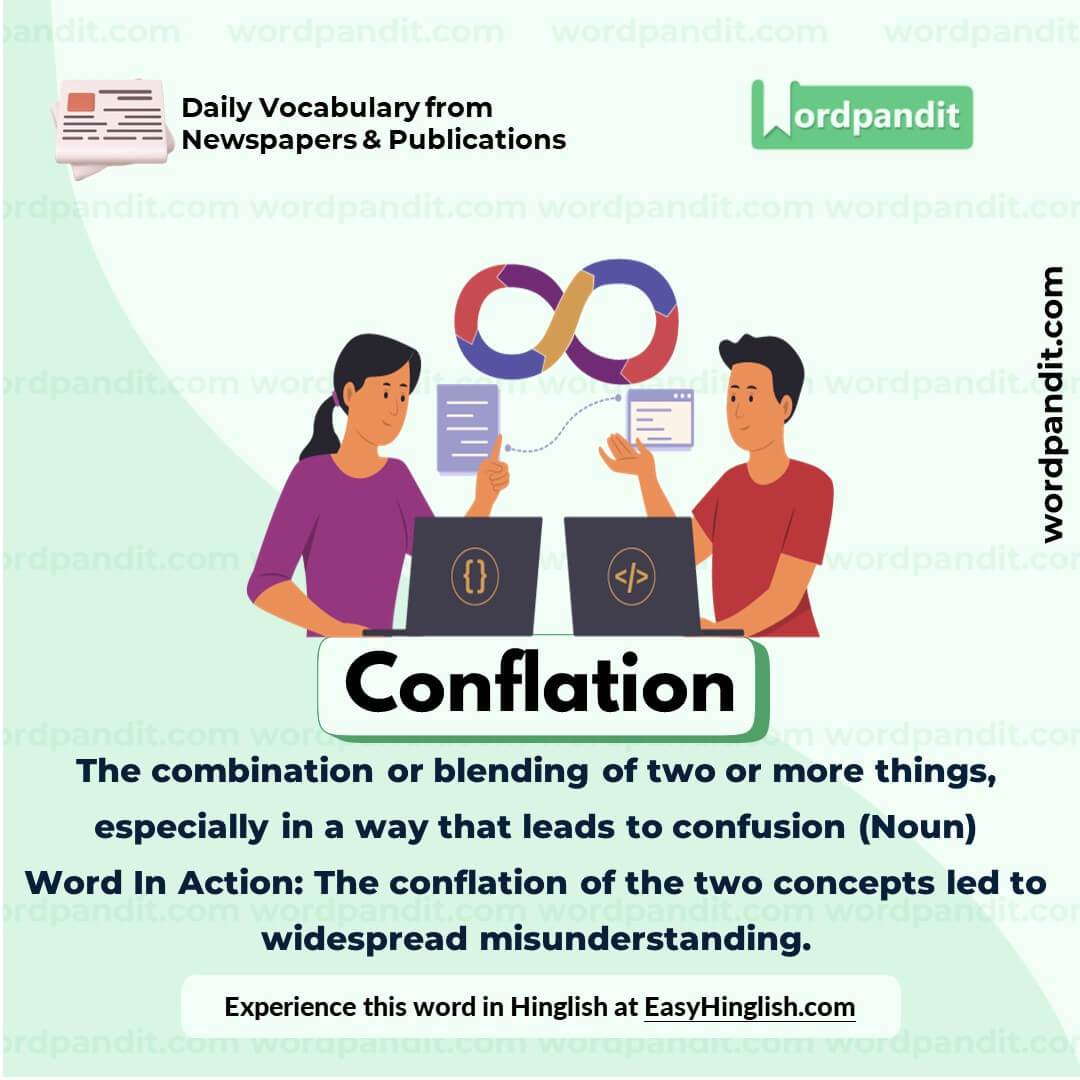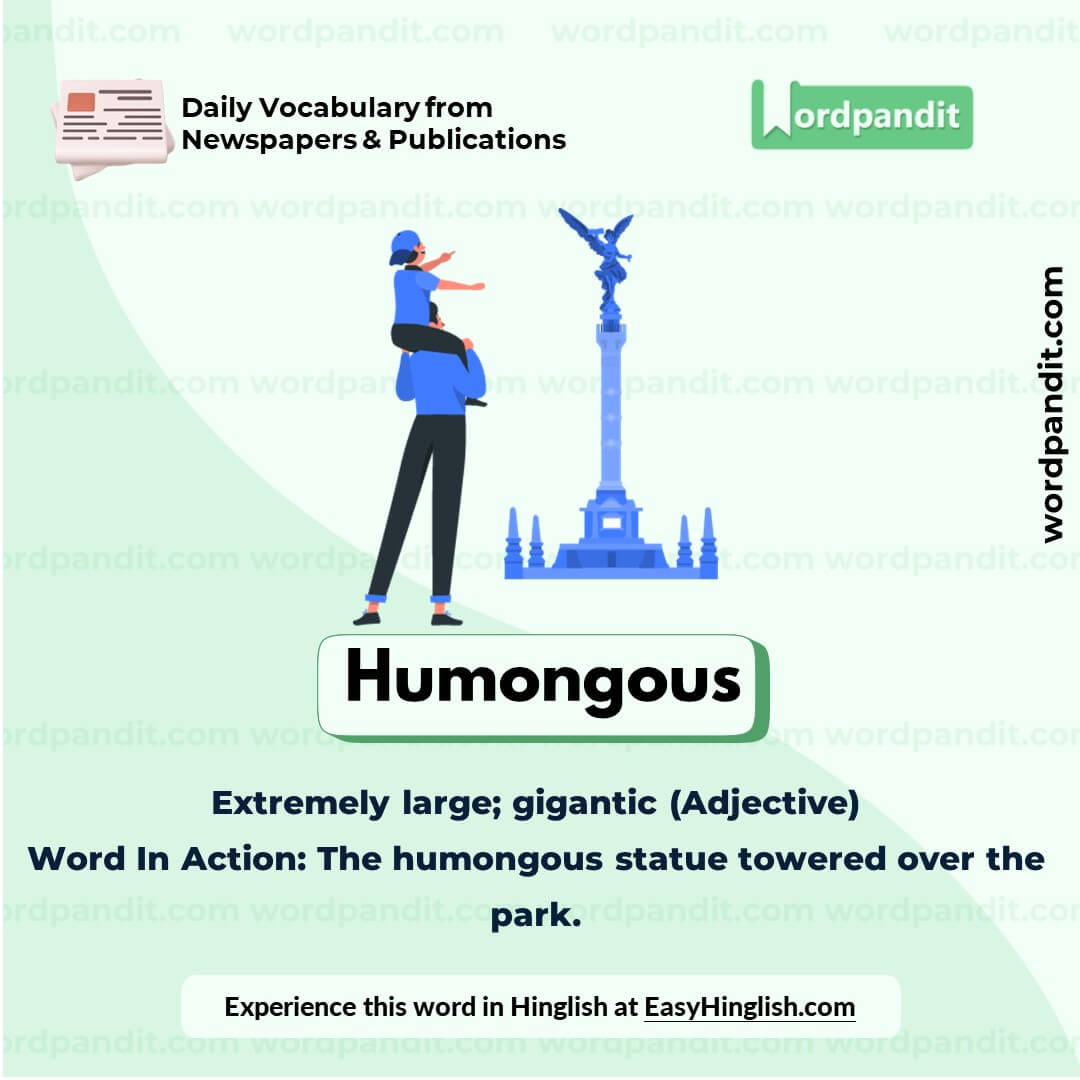Daily Vocabulary from Indian Newspapers and Publications
Welcome to Wordpandit’s Indian Vocabulary Hub
At Wordpandit, we understand the importance of staying rooted in the local context while expanding your language skills. This section focuses on enriching your vocabulary with words and phrases drawn from India’s leading newspapers and publications, ensuring you're learning vocabulary that is practical, relevant, and uniquely Indian.
Why Indian Sources Matter
We believe that the best way to master any language is by immersing yourself in local content. That’s why we carefully curate vocabulary from top Indian publications, including:
- The Hindu
- The Times of India
- The Economic Times
- Hindustan Times
- Live Mint
- The Indian Express
- And many others...
Stay Updated, Stay Relevant
With daily updates from Indian news sources, you’ll be consistently learning words that reflect the trends and shifts in Indian society and culture. Our focus is to provide vocabulary that enhances your understanding of the language in an Indian context.
How Wordpandit Supports Your Goals
Whether you’re preparing for exams, aiming to improve your professional communication, or simply want to stay connected with the latest Indian vocabulary, Wordpandit is here to guide you every step of the way.
Learn with a Practical Approach
Our interactive learning methodology includes real-world examples, engaging activities, and context-specific usage to ensure that every word becomes part of your active vocabulary.
Dive into Indian Vocabulary Today!
Why Choose Wordpandit?
Practical Learning: Focus on words you'll actually encounter in real-world reading, enhancing your comprehension and communication skills.
Diverse Content: From current affairs to scientific breakthroughs, our varied sources expose you to vocabulary across multiple domains.
Effortless Integration: Make Wordpandit a part of your daily routine. Just a few minutes each day can significantly boost your lexicon over time.
Your Path to Vocabulary Mastery
- Visit our Daily Vocabulary section regularly
- Explore new words and their usage in context
- Practice incorporating these words into your own writing and speech
- Track your progress as your vocabulary expands
Start Your Journey Today
Embark on your vocabulary enhancement journey with Wordpandit. By consistently engaging with our daily posts, you'll build a robust vocabulary that serves you well in academic, professional, and personal contexts.
Remember, a word a day keeps linguistic limitations at bay. Make Wordpandit your daily companion in the quest for vocabulary excellence!
WORD-1: Adjoining
Context:
"The city gas retailer in Mumbai, hiked CNG prices in Mumbai and adjoining areas by Rs 2 per kg, according to the MGL website." - The New Indian Express
Explanatory Paragraph:
The word "adjoining" refers to something that is next to or connected with another. It is commonly used to describe areas, rooms, or properties that are physically close to each other.
Meaning: Situated next to or joined with something else. (Adjective)
Pronunciation: uh-joi-ning
Difficulty Level: ⭐⭐ Beginner
Etymology: Derived from the Middle English word "ajoinen," which comes from Old French "ajoindre," meaning to join or connect.
Synonyms & Antonyms:
Synonyms: Adjacent, neighboring, contiguous, bordering
Antonyms: Distant, separate, faraway, remote
Usage Examples:
- The hotel room has an adjoining bathroom for convenience.
- The adjoining buildings were painted in the same color scheme to maintain uniformity.
- We decided to explore the adjoining village during our trip to the countryside.
- There are plans to expand the park into the adjoining land owned by the municipality.
Cultural Reference:
"In urban planning, adjoining spaces are often utilized to create interconnected parks or shared public areas, enhancing community living." - Urban Development Journal
Think About It:
How does the concept of adjoining spaces play a role in fostering community and shared resources in urban planning?
Quick Activity:
Look around your home or workplace and identify two adjoining spaces. Describe how their proximity influences how you use them.
Memory Tip:
Think of "adjoining" as "a door joining" two spaces to remind yourself it means being next to or connected.
Real-World Application:
The term "adjoining" is frequently used in real estate listings, urban planning, and descriptions of geographical areas to indicate proximity or shared boundaries, helping convey important location details.
WORD-2: Congenitally
Context:
"A government invested so congenitally overseas as America’s, with 27 percent of federal employees in defence and international relations, can never be small." - The New Indian Express
Explanatory Paragraph:
The word "congenitally" refers to something inherent, natural, or existing from birth. It can describe qualities, tendencies, or characteristics that are innate or deeply ingrained, either biologically or metaphorically.
Meaning: In a way that is inherent or present from birth. (Adverb)
Pronunciation: kun-JEN-it-lee
Difficulty Level: ⭐⭐⭐ Intermediate
Etymology: Derived from the Latin word "congenitus," meaning "born with," combining "con-" (together) and "genitus" (birth).
Synonyms & Antonyms:
Synonyms: Inherently, innately, naturally, inherently
Antonyms: Acquired, learned, external
Usage Examples:
- She is congenitally optimistic, always finding the silver lining in any situation.
- The artist’s congenitally creative mind led to innovations that reshaped the industry.
- The organization is congenitally resistant to change, clinging to its traditional processes.
- Some health conditions are congenitally present, requiring early diagnosis and care.
Cultural Reference:
"In psychology, the term 'congenitally' is often used to describe innate personality traits that shape an individual's behavior from an early age." - Psychological Insights Journal
Think About It:
Do you believe that systems or organizations, like individuals, can be 'congenitally' inclined toward certain behaviors or practices? Why or why not?
Quick Activity:
Think of a personal trait or habit you believe you were "born with." Write a short paragraph explaining why you think it is congenital.
Memory Tip:
Remember "congenitally" by breaking it down as "con" (with) + "genital" (birth), meaning something you are born with or something innate.
Real-World Application:
"Congenitally" is often used in discussions of biology, psychology, and social sciences to highlight characteristics or traits that are inherent or deeply rooted, helping to explain behavior or phenomena.
WORD-3: Satirical
Context:
"Dogecoin started out as a satirical take on the plethora of crypto-coins in the ether." - The New Indian Express
Explanatory Paragraph:
The word "satirical" describes something that uses humor, irony, exaggeration, or ridicule to criticize or mock human behavior, societal norms, or institutions. Often associated with literature, art, or media, satire aims to provoke thought and inspire change while entertaining.
Meaning: Using humor, irony, or exaggeration to criticize or mock. (Adjective)
Pronunciation: suh-TIR-ih-kul
Difficulty Level: ⭐⭐⭐ Intermediate
Etymology: Derived from the Latin word "satira," meaning "a poetic medley," and associated with the Greek term "satyr," which references mythological figures known for their wit and humor.
Synonyms & Antonyms:
Synonyms: Mocking, ironic, sarcastic, lampooning
Antonyms: Serious, earnest, sincere, literal
Usage Examples:
- The movie's satirical tone cleverly critiqued modern consumerism.
- Her satirical article about political corruption sparked heated debates online.
- The cartoonist is famous for his satirical drawings that poke fun at societal norms.
- The book offers a satirical perspective on corporate culture and its absurdities.
Cultural Reference:
"Jonathan Swift's 'A Modest Proposal' is one of the most famous satirical works, using irony and exaggeration to critique social issues in 18th-century Ireland." - Literature Classics
Think About It:
Can satire be an effective tool for bringing about societal change, or does it risk being misunderstood as mere humor?
Quick Activity:
Write a short satirical sentence critiquing a modern trend or issue. Focus on using humor or irony to convey your point.
Memory Tip:
Link "satirical" with "satire," which sounds like "sight-hire," suggesting a humorous lens through which to view flaws or absurdities.
Real-World Application:
Satirical content is commonly used in media, such as television shows, editorial cartoons, and literature, to critique politics, culture, or social issues, making it a powerful tool for raising awareness and engaging audiences.
WORD-4: Conflation
Context:
"Right off the bat, we have a conflation of governance and business. The gravitas is missing in the choice of the public interface, but DOGE’s task is one of dead seriousness." - The New Indian Express
Explanatory Paragraph:
The word "conflation" refers to the merging or combining of two or more different ideas, concepts, or entities into one. It often implies confusion or a lack of distinction between the merged elements, leading to a mix-up or misrepresentation.
Meaning: The combination or blending of two or more things, especially in a way that leads to confusion. (Noun)
Pronunciation: kon-FLAY-shun
Difficulty Level: ⭐⭐⭐ Intermediate
Etymology: Derived from the Latin word "conflare," meaning "to blow together" or "to fuse," and later adapted into Middle English to signify merging or combining.
Synonyms & Antonyms:
Synonyms: Fusion, amalgamation, blending, merger
Antonyms: Distinction, separation, differentiation, segregation
Usage Examples:
- The report criticized the conflation of personal opinions with factual evidence.
- Her argument suffered from the conflation of two unrelated issues, which confused her audience.
- In the debate, the conflation of national security and immigration policy led to oversimplified solutions.
- Modern advertisements often rely on the conflation of luxury and happiness to attract consumers.
Cultural Reference:
"In media coverage, the conflation of entertainment and news has sparked discussions about the credibility and purpose of journalism." - Media Studies Journal
Think About It:
How does the conflation of distinct ideas or issues in public discourse affect our ability to solve problems effectively?
Quick Activity:
Identify two distinct concepts that are often conflated in discussions (e.g., freedom and privilege). Write a sentence explaining why it is important to differentiate them.
Memory Tip:
Think of "conflation" as "confusion by fusion," which captures the idea of blending things together in a way that creates misunderstandings.
Real-World Application:
"Conflation" is frequently discussed in fields such as politics, philosophy, and media analysis to emphasize the importance of clarity and precision in communication and decision-making.
WORD-5: Humongous
Context:
"Lenin gave Russia a humongous bureaucracy within two years after the revolution, but, today, the numbers, including the siloviki (law enforcement and security personnel, and the military bureaucracy) are reportedly down to fewer than 500,000." - The New Indian Express
Explanatory Paragraph:
The word "humongous" is an informal term used to describe something that is extremely large or enormous in size, quantity, or degree. It is often used in casual conversations to emphasize magnitude.
Meaning: Extremely large; gigantic. (Adjective)
Pronunciation: hyoo-MUHNG-gus
Difficulty Level: ⭐ Beginner
Etymology: First used in American English in the mid-20th century, "humongous" is a blend of "huge" and "monstrous," created to emphasize size.
Synonyms & Antonyms:
Synonyms: Massive, colossal, enormous, gigantic
Antonyms: Tiny, small, petite, minuscule
Usage Examples:
- The new stadium is absolutely humongous, seating over 100,000 spectators.
- We ordered a humongous pizza that could feed the entire party.
- The project faced humongous challenges, but the team managed to complete it on time.
- The elephant at the zoo looked humongous compared to the smaller animals nearby.
Cultural Reference:
"Humongous" is often used in pop culture to exaggerate or emphasize size, such as in movie taglines or advertisements for oversized products or attractions.
Think About It:
Why do you think informal words like "humongous" are often more effective at conveying emotions than their formal counterparts?
Quick Activity:
Think of an object or event in your life that was "humongous" and describe it in a short paragraph, using other descriptive words to emphasize its size.
Memory Tip:
Link "humongous" to "huge" and "monstrous" to remember that it means something extremely large or oversized.
Real-World Application:
The term "humongous" is commonly used in informal conversations, advertising, and storytelling to emphasize size in an engaging and relatable manner.
















